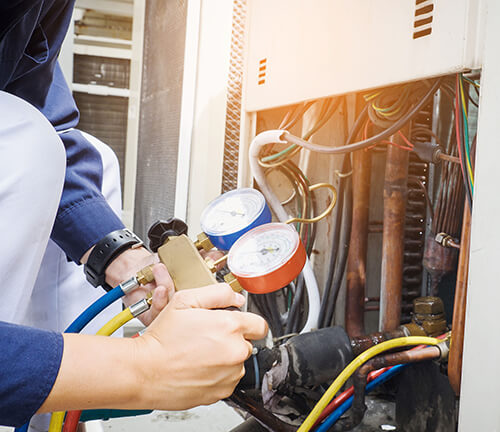Trusted Services from DMAKS HVAC for Your Comfort Needs.
Trusted Services from DMAKS HVAC for Your Comfort Needs.
Blog Article
Energy-Efficient HVAC Solutions to Save Money On Energy Costs
As energy costs continue to increase, the importance of energy-efficient HVAC systems becomes increasingly apparent. These systems not only assure considerable savings on energy costs but also contribute to a more sustainable future by decreasing power usage. With numerous options available, consisting of geothermal heat pumps and ductless mini-splits, residential property proprietors deal with a plethora of selections that can boost convenience and air quality. Recognizing the essential features and upkeep demands is crucial to optimizing these advantages. What aspects should be prioritized when picking the best system for your demands?
Benefits of Energy-Efficient Cooling And Heating Systems
Energy-efficient HVAC systems provide many benefits that expand past plain cost savings. By consuming less energy, these systems add to reduce greenhouse gas exhausts, aiding to combat climate change and promote sustainability.
Additionally, energy-efficient heating and cooling systems commonly give enhanced convenience degrees. A lot of these systems feature sophisticated technology that allows for far better temperature level control and improved air quality (DMAKS HVAC). This leads to a healthier interior atmosphere, which is especially crucial for people with allergic reactions or respiratory system concerns
Additionally, buying energy-efficient cooling and heating systems can boost residential or commercial property value. As even more customers focus on energy efficiency, homes and buildings outfitted with these systems might draw in higher proposals in the realty market.
Kinds of Energy-Efficient A/c Options
How can homeowners and businesses pick one of the most suitable energy-efficient HVAC alternatives for their requirements? The market offers a selection of energy-efficient heating and cooling systems, each developed to boost convenience while decreasing power usage.
One option is the variable cooling agent flow (VRF) system, which successfully manages the temperature in several zones within a structure. This system adapts its cooling agent circulation to match the desired temperature level, resulting in substantial energy savings.
One more popular option is geothermal heatpump, which make use of the planet's secure temperature level to heat and awesome areas. By moving heat to and from the ground, these systems demonstrate impressive effectiveness, especially in moderate climates.
Additionally, ductless mini-split systems offer an energy-efficient alternative for homes doing not have ductwork. These systems enable zone-specific cooling and heating, reducing energy waste in empty areas.
Finally, high-efficiency heating systems and air conditioning system, with advanced SEER and AFUE scores, offer reputable environment control while consuming less power than typical models. By examining these alternatives, homeowners and services can pick a HVAC system tailored to their certain demands and power efficiency goals.
Secret Functions to Take Into Consideration

Following, investigate the kind of compressor used in the system. DMAKS HVAC. Variable-speed compressors can readjust their output to match the home heating or cooling down demand, bring about enhanced convenience and energy financial savings compared to single-speed designs. Additionally, try to find systems equipped with wise thermostats that supply programmable settings and remote gain access to, enabling much better control over power consumption
One more important attribute is the system's air purification capacity. High-efficiency filters can boost interior air top quality and minimize power usage by making sure the system runs effectively. Take into consideration the kind of cooling agent utilized; modern systems often use green cooling agents that have a lower environmental influence.
Finally, guarantee that the system works with zoning modern technology, which permits for personalized temperature control in various areas of your home, boosting convenience while reducing power use.
Tips for Choosing the Right System


Following, take into consideration power efficiency scores, especially the Seasonal Energy Performance Ratio (SEER) for cooling systems and the Yearly Fuel Utilization Performance (AFUE) for home heating systems. Higher rankings suggest greater performance, which can cause significant financial savings on utility bills gradually.
Furthermore, evaluate the kind of heating and cooling system that ideal fits your lifestyle and spending plan. Options consist of air conditioning, ductless mini-splits, and heatpump, each with its own collection of advantages and downsides.
Don't forget the significance of correct setup and sizing; an inaccurately sized system can cause inefficiencies and boosted wear. Seek advice from with a professional A/c service provider to obtain expert recommendations tailored to your home's one-of-a-kind requirements. This extensive strategy will guarantee that you pick an energy-efficient HVAC system that satisfies see this page your requirements and budget plan efficiently.
Upkeep for Ideal Effectiveness
As soon as the best cooling and heating system is in area, ongoing upkeep becomes crucial to making certain optimal effectiveness and long life. A properly maintained system operates better, leading to reduced power intake and lowered energy costs. Regular inspections and tune-ups should be scheduled at the very least twice a try this year-- once before the cooling season and once prior to the home heating period.

Homeowners must additionally be alert concerning monitoring their cooling and heating system's performance. Uncommon sounds, varying temperature levels, or increased energy costs can indicate underlying problems that need instant focus. By dealing with these worries promptly, property owners can protect against costly repair work and expand the life-span of their systems.
Investing in a maintenance strategy with a certified technician not only boosts effectiveness however additionally gives assurance, understanding that the system is running at its ideal. DMAKS HVAC. Normal upkeep is therefore vital for maintaining power performance and reducing general functional prices
Verdict
To conclude, energy-efficient heating and cooling systems provide a feasible option for lowering energy costs while boosting convenience and air top quality. By including innovative modern technologies and alternatives such as geothermal heatpump and ductless mini-splits, homeowner can achieve significant power financial savings and add to ecological sustainability. Cautious factor to consider of system functions and ongoing maintenance further ensures optimum efficiency, making energy-efficient systems a prudent investment for both economic and eco-friendly advantages.
Report this page